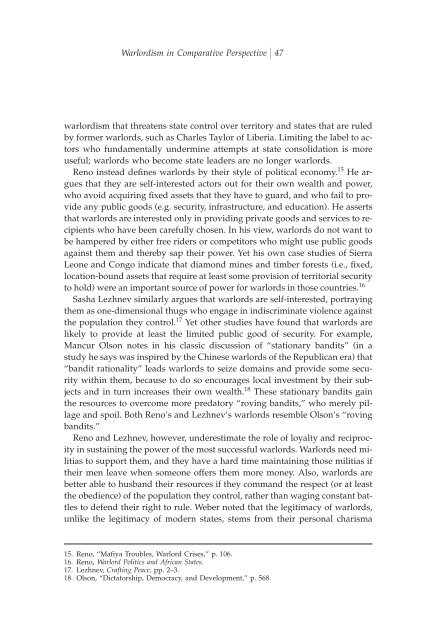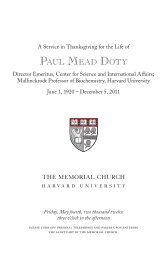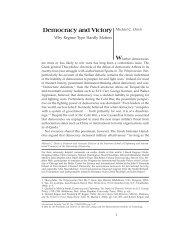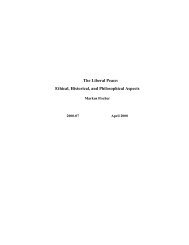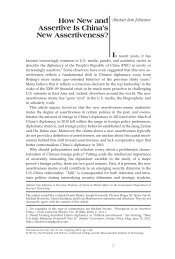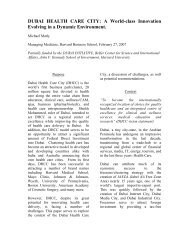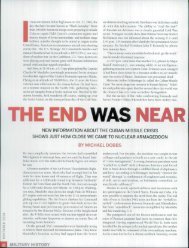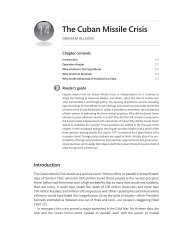Warlordism in Comparative Perspective - MIT Press Journals
Warlordism in Comparative Perspective - MIT Press Journals
Warlordism in Comparative Perspective - MIT Press Journals
You also want an ePaper? Increase the reach of your titles
YUMPU automatically turns print PDFs into web optimized ePapers that Google loves.
<strong>Warlordism</strong> <strong>in</strong> <strong>Comparative</strong> <strong>Perspective</strong> 47<br />
warlordism that threatens state control over territory and states that are ruled<br />
by former warlords, such as Charles Taylor of Liberia. Limit<strong>in</strong>g the label to actors<br />
who fundamentally underm<strong>in</strong>e attempts at state consolidation is more<br />
useful; warlords who become state leaders are no longer warlords.<br />
Reno <strong>in</strong>stead deªnes warlords by their style of political economy. 15 He argues<br />
that they are self-<strong>in</strong>terested actors out for their own wealth and power,<br />
who avoid acquir<strong>in</strong>g ªxed assets that they have to guard, and who fail to provide<br />
any public goods (e.g. security, <strong>in</strong>frastructure, and education). He asserts<br />
that warlords are <strong>in</strong>terested only <strong>in</strong> provid<strong>in</strong>g private goods and services to recipients<br />
who have been carefully chosen. In his view, warlords do not want to<br />
be hampered by either free riders or competitors who might use public goods<br />
aga<strong>in</strong>st them and thereby sap their power. Yet his own case studies of Sierra<br />
Leone and Congo <strong>in</strong>dicate that diamond m<strong>in</strong>es and timber forests (i.e., ªxed,<br />
location-bound assets that require at least some provision of territorial security<br />
to hold) were an important source of power for warlords <strong>in</strong> those countries. 16<br />
Sasha Lezhnev similarly argues that warlords are self-<strong>in</strong>terested, portray<strong>in</strong>g<br />
them as one-dimensional thugs who engage <strong>in</strong> <strong>in</strong>discrim<strong>in</strong>ate violence aga<strong>in</strong>st<br />
the population they control. 17 Yet other studies have found that warlords are<br />
likely to provide at least the limited public good of security. For example,<br />
Mancur Olson notes <strong>in</strong> his classic discussion of “stationary bandits” (<strong>in</strong> a<br />
study he says was <strong>in</strong>spired by the Ch<strong>in</strong>ese warlords of the Republican era) that<br />
“bandit rationality” leads warlords to seize doma<strong>in</strong>s and provide some security<br />
with<strong>in</strong> them, because to do so encourages local <strong>in</strong>vestment by their subjects<br />
and <strong>in</strong> turn <strong>in</strong>creases their own wealth. 18 These stationary bandits ga<strong>in</strong><br />
the resources to overcome more predatory “rov<strong>in</strong>g bandits,” who merely pillage<br />
and spoil. Both Reno’s and Lezhnev’s warlords resemble Olson’s “rov<strong>in</strong>g<br />
bandits.”<br />
Reno and Lezhnev, however, underestimate the role of loyalty and reciprocity<br />
<strong>in</strong> susta<strong>in</strong><strong>in</strong>g the power of the most successful warlords. Warlords need militias<br />
to support them, and they have a hard time ma<strong>in</strong>ta<strong>in</strong><strong>in</strong>g those militias if<br />
their men leave when someone offers them more money. Also, warlords are<br />
better able to husband their resources if they command the respect (or at least<br />
the obedience) of the population they control, rather than wag<strong>in</strong>g constant battles<br />
to defend their right to rule. Weber noted that the legitimacy of warlords,<br />
unlike the legitimacy of modern states, stems from their personal charisma<br />
15. Reno, “Maªya Troubles, Warlord Crises,” p. 106.<br />
16. Reno, Warlord Politics and African States.<br />
17. Lezhnev, Craft<strong>in</strong>g Peace, pp. 2–3.<br />
18. Olson, “Dictatorship, Democracy, and Development,” p. 568.


